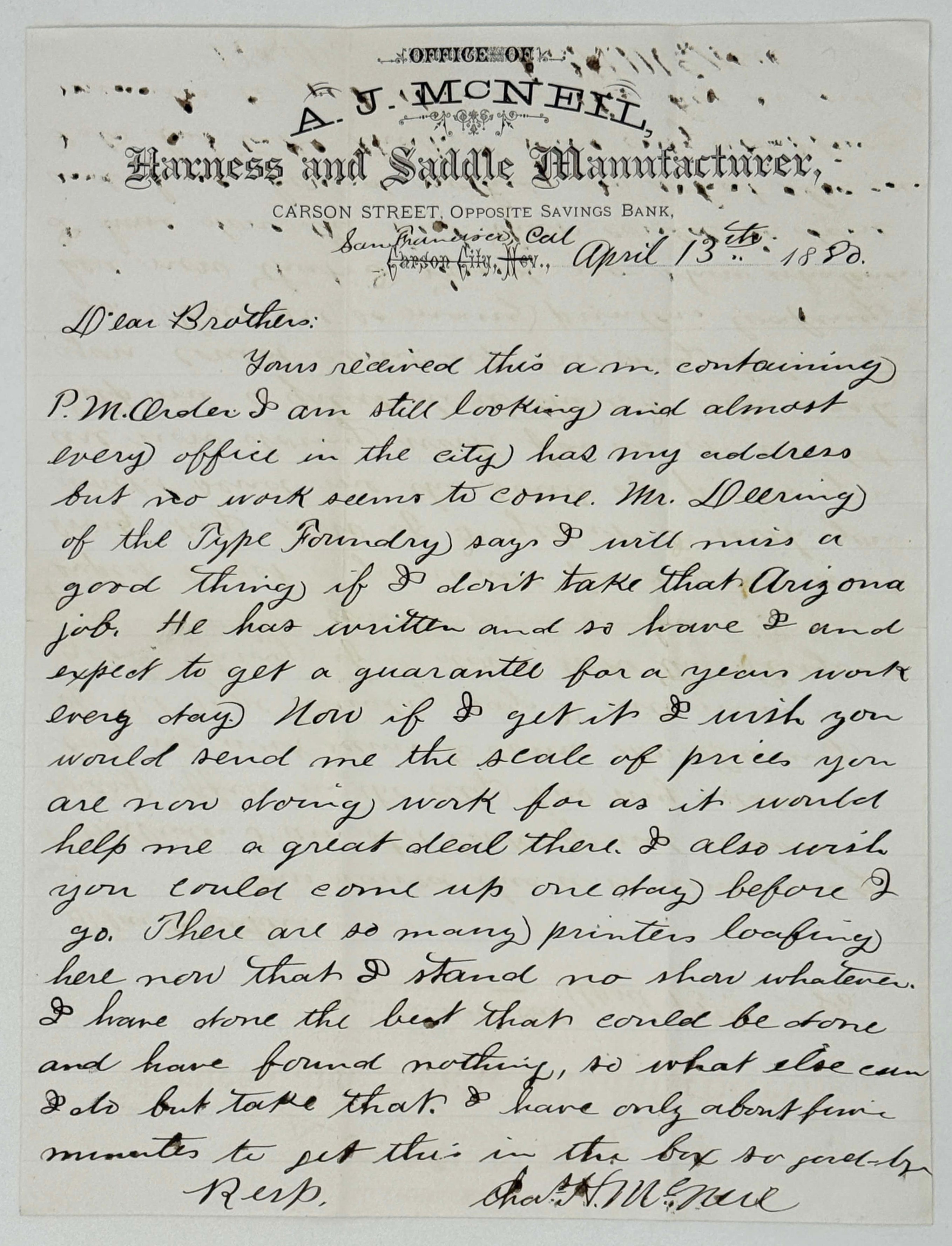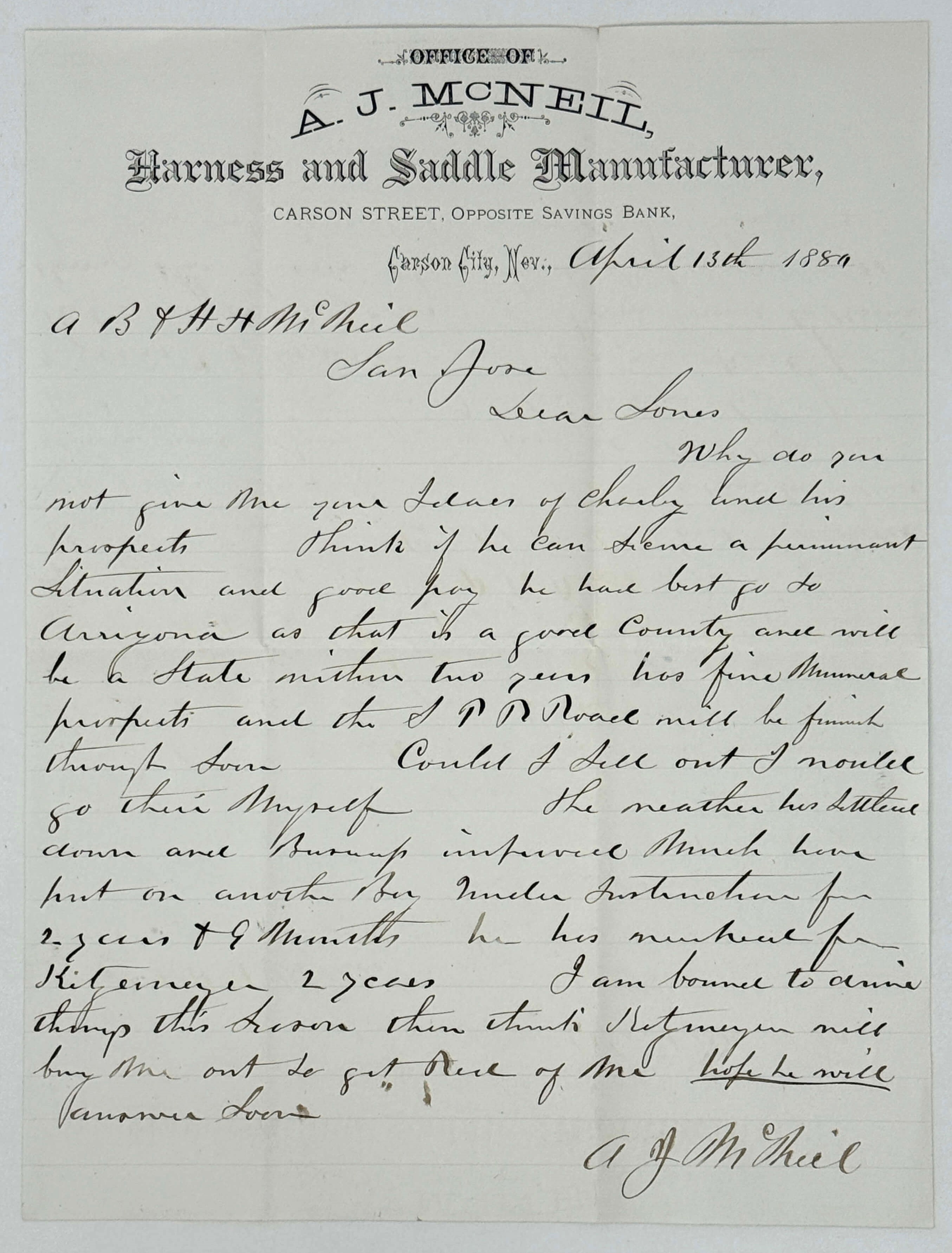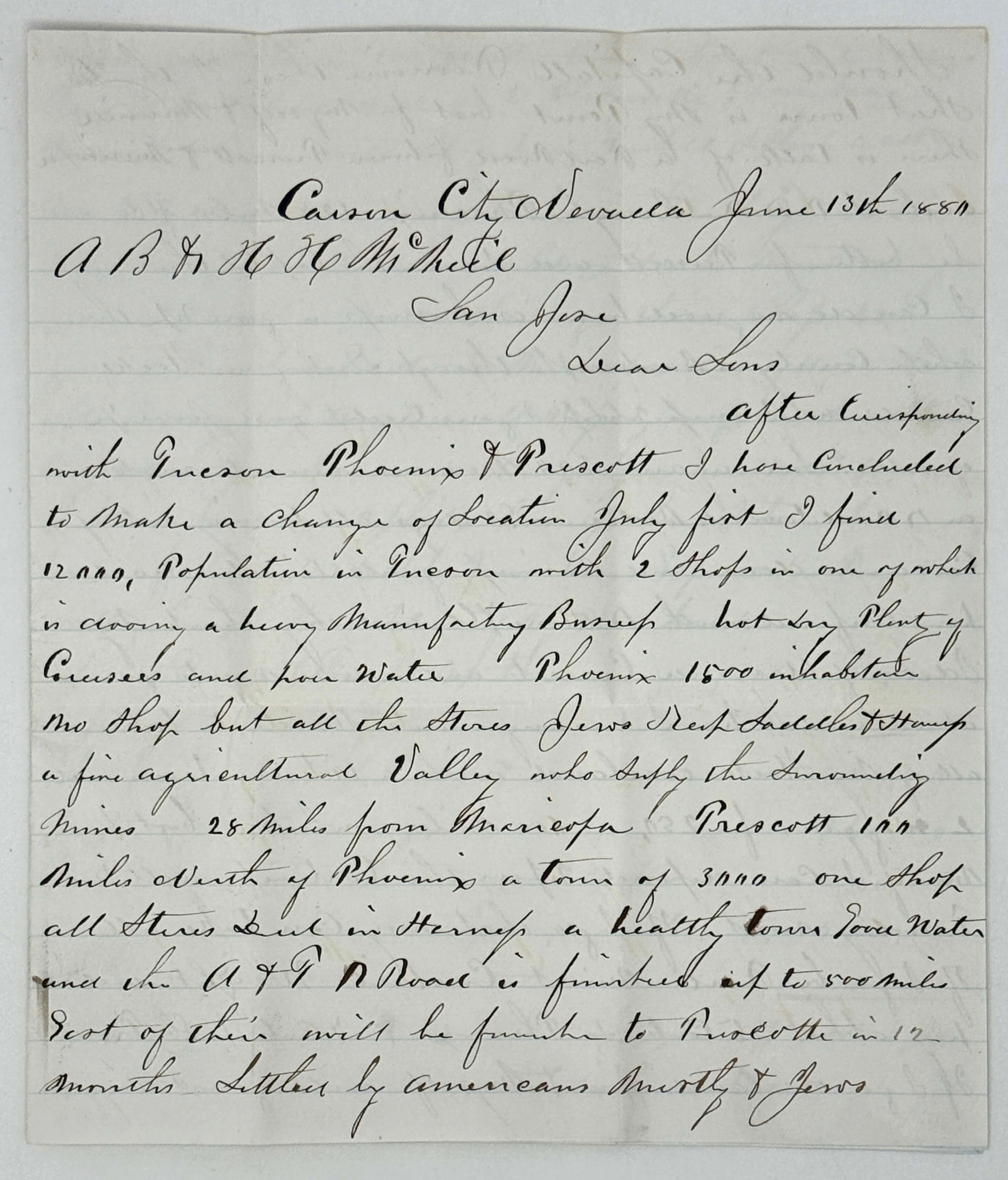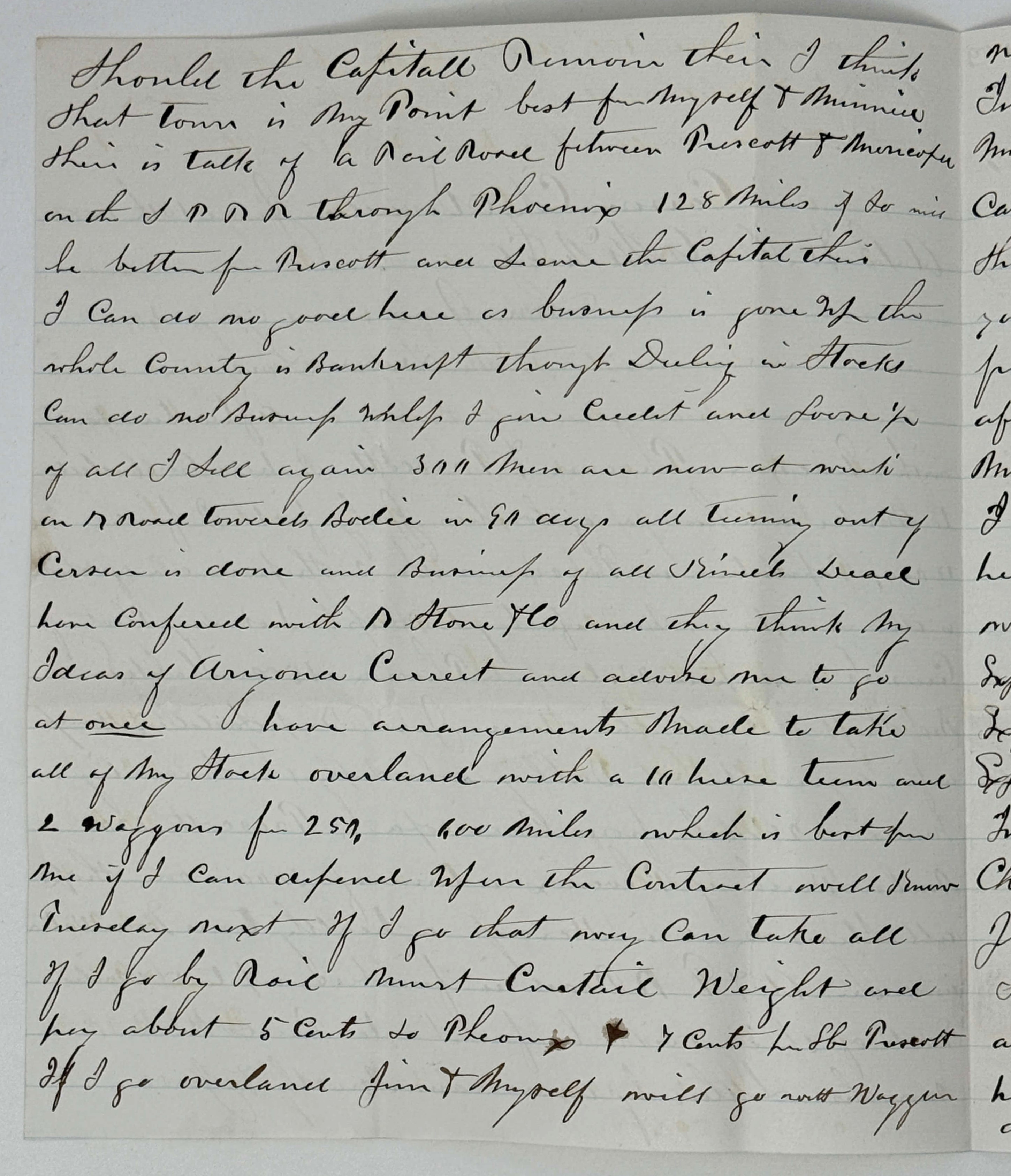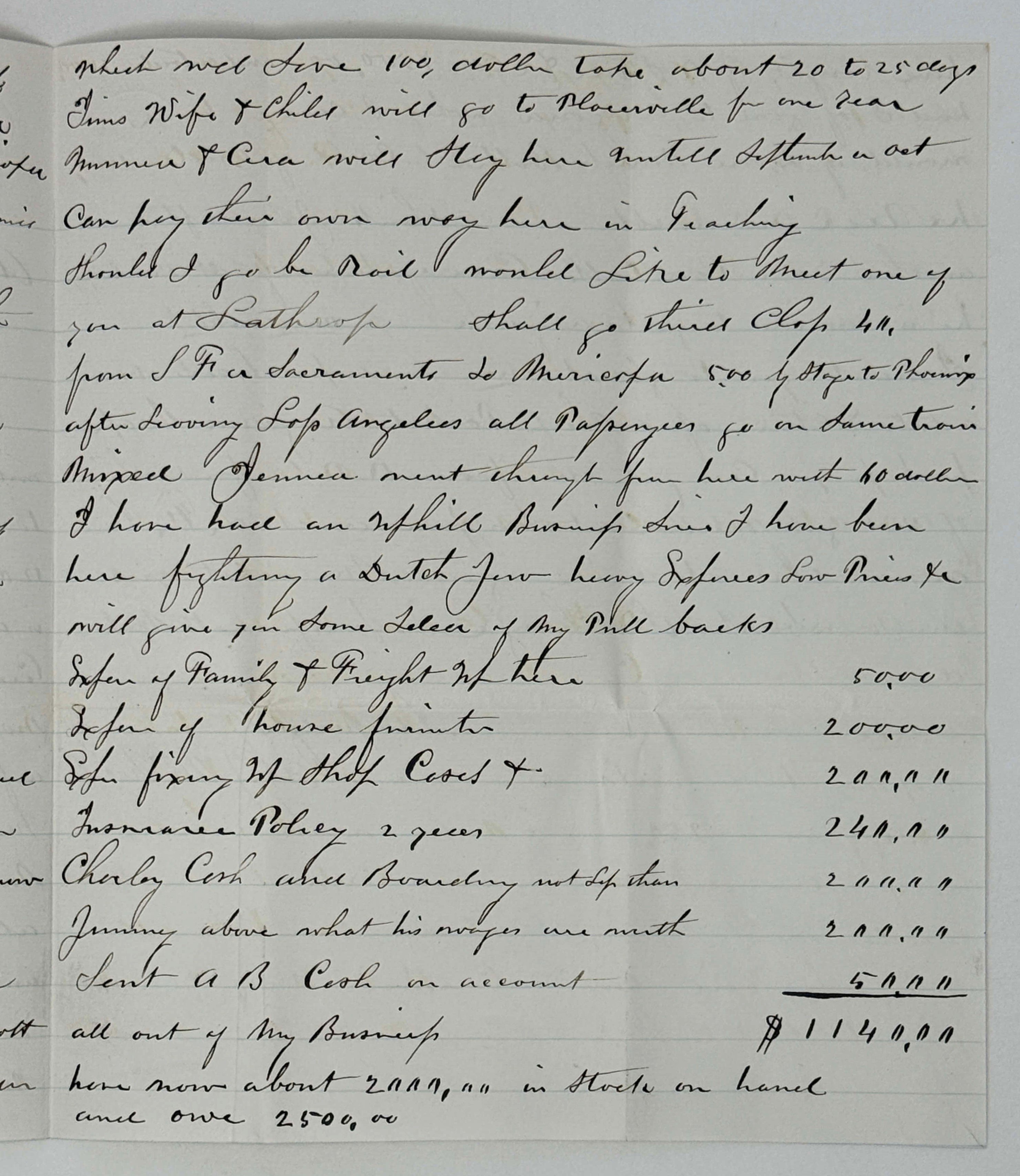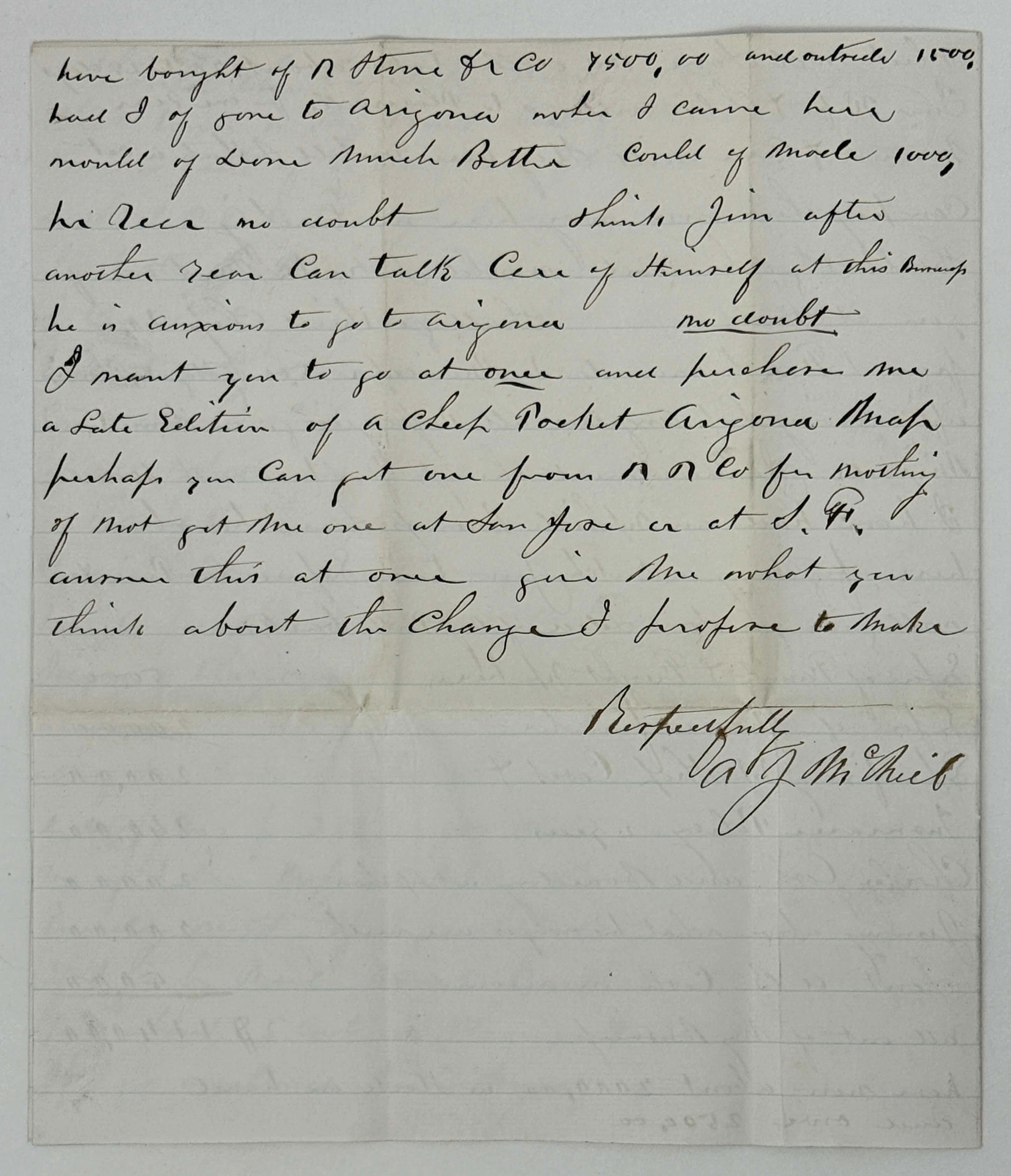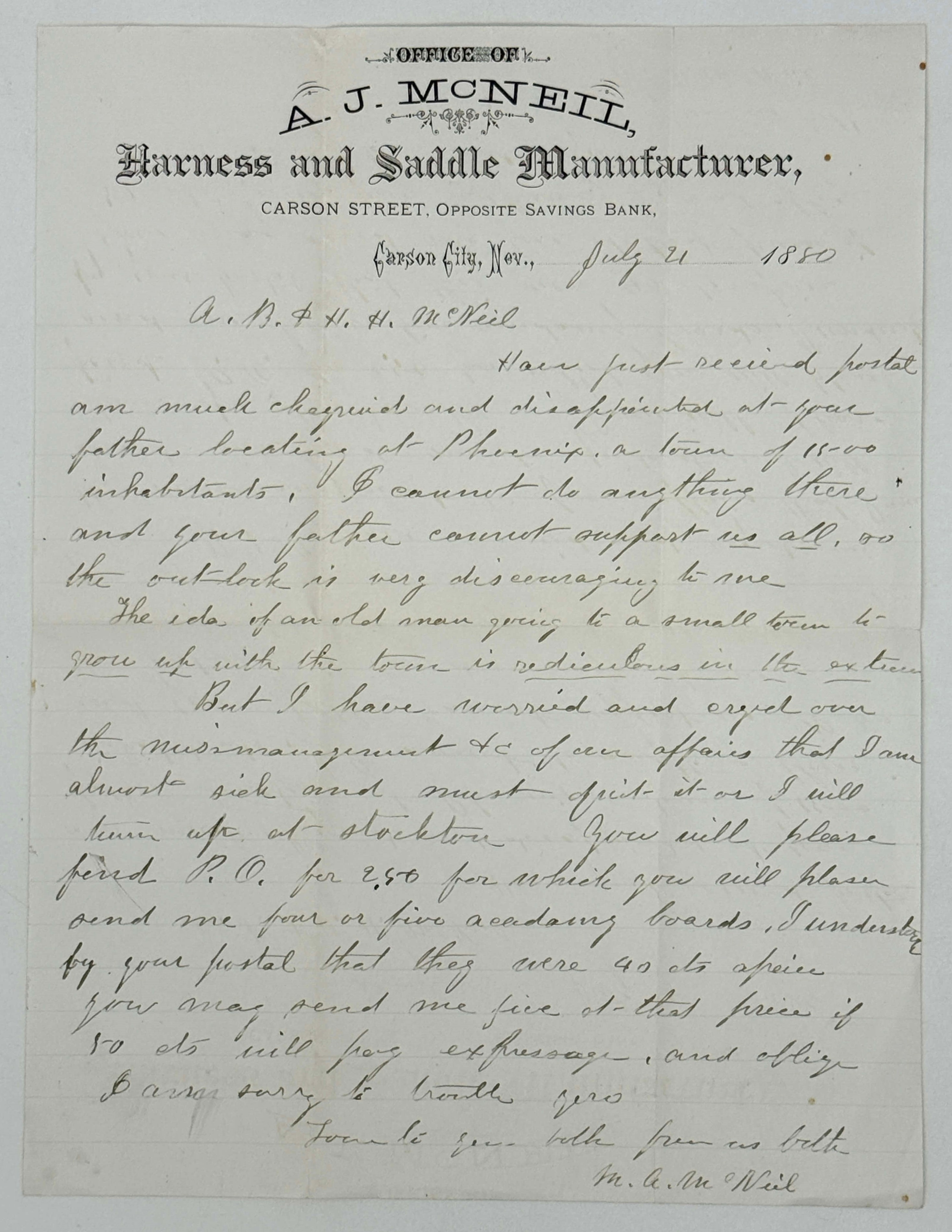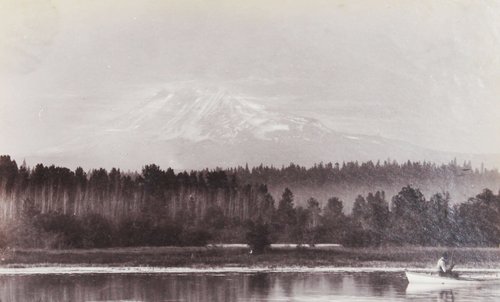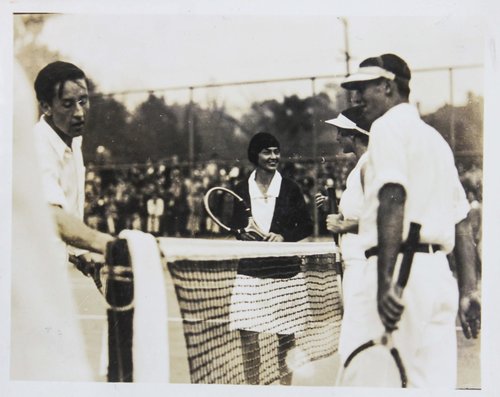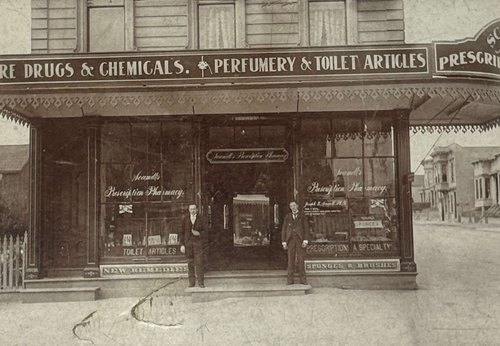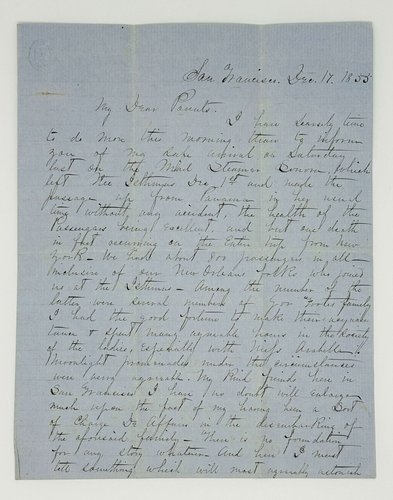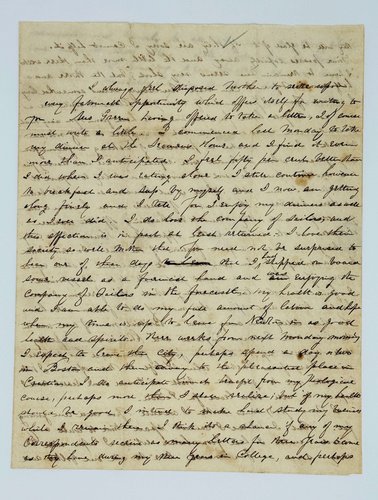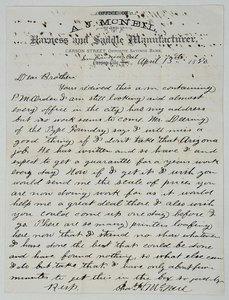
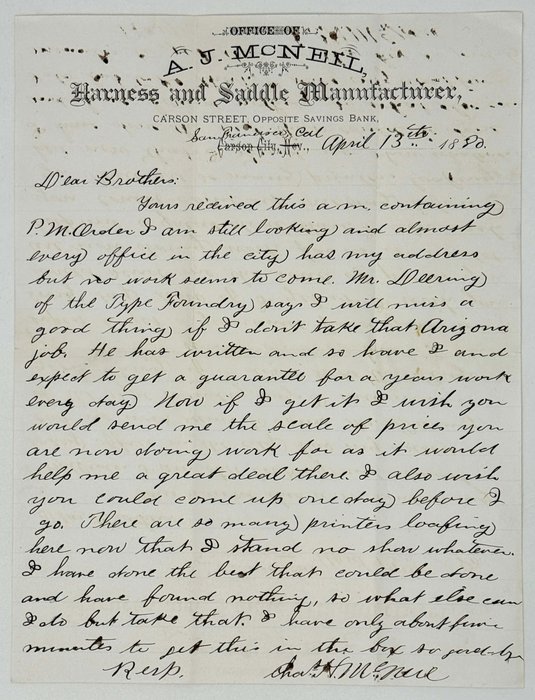
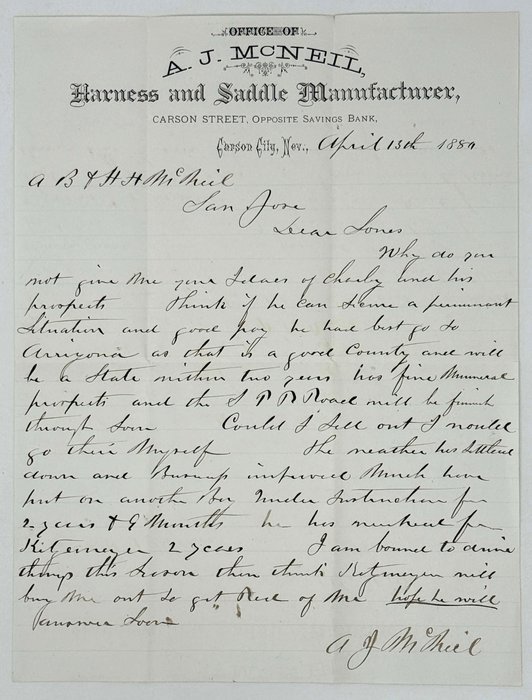
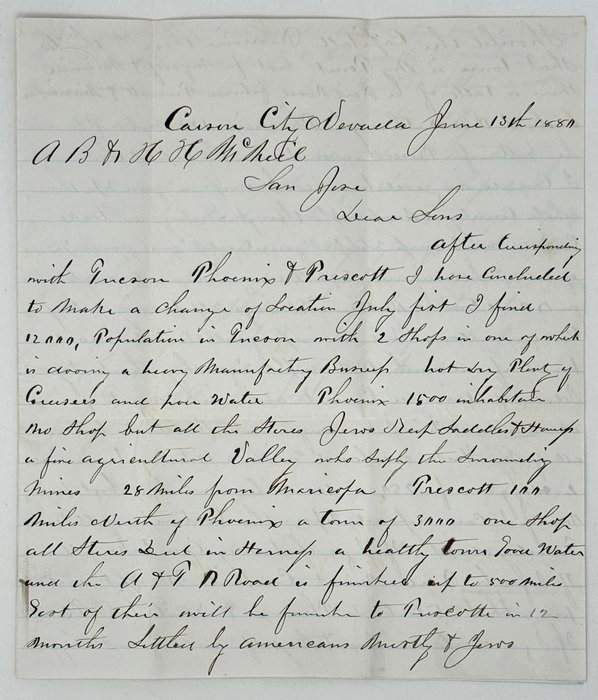
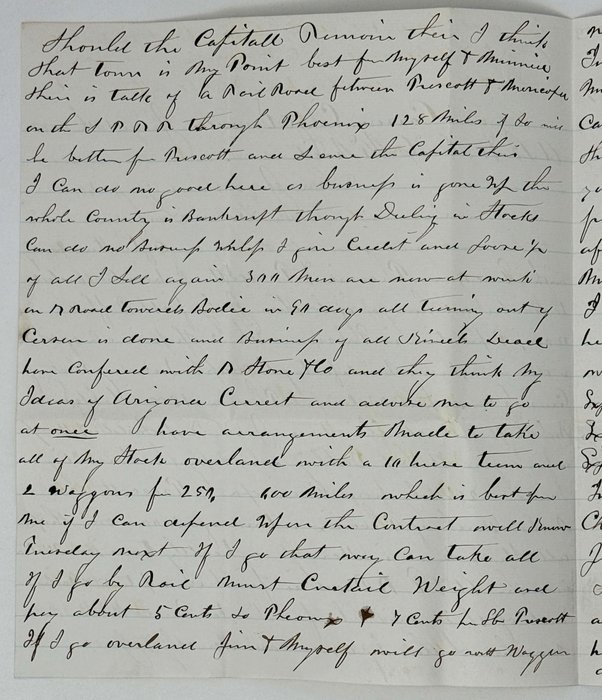
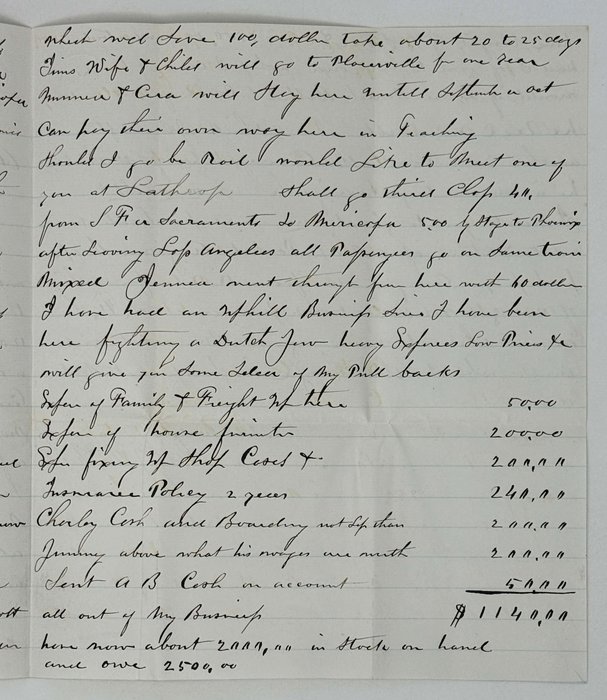
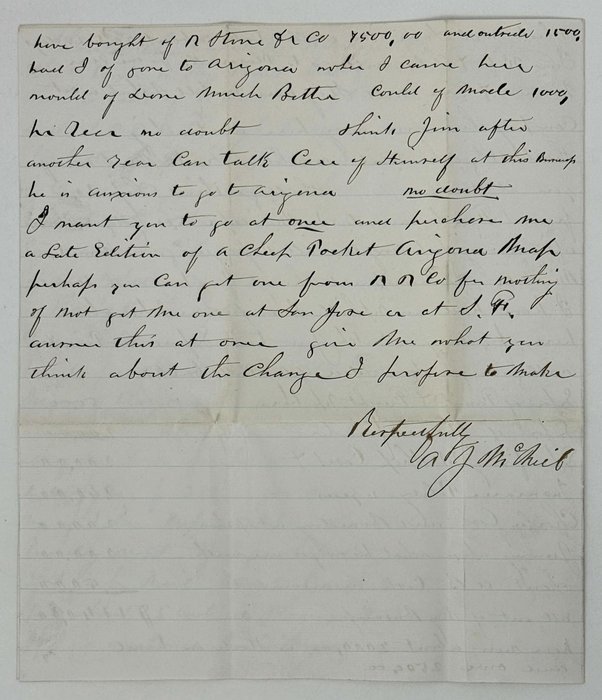
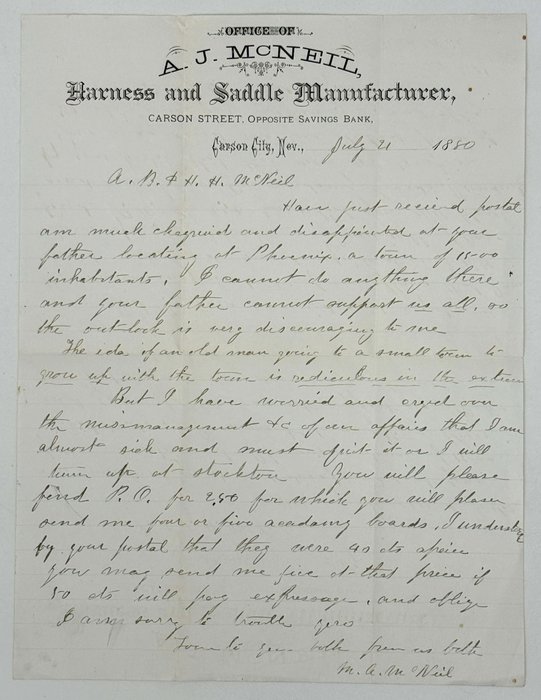
#MC93
1880
Ca. 10,5 x 8 in; 9 x 10 in. Brown ink on wove lined paper. All but one letter with the printed letterhead of the “Office of A. J. McNeil, Harness and Saddle Manufacturer, Carson Street, Opposite Savings Bank.” Fold marls, but otherwise a very good collection of interesting letters, written in a legible hand.
Historically interesting collection of four original private letters, documenting the early allure of the Arizona Territory and the financial crisis of the 1880s pushing people to the American Southwest.
In the early 1880s, the Arizona Territory was a rapidly evolving frontier region, attracting migrants drawn by mining prospects, expanding railroads, and the promise of new economic opportunities. Although still sparsely populated compared to more established states, the territory was experiencing steady growth as settlers arrived seeking to capitalize on its natural resources and the impending possibility of statehood.
The correspondence was written by the McNeil family, a multi-generational lineage of craftsmen, printers, and publishers. Originally based in Nevada, the family later established lasting roots in California and the Arizona Territory. Albertus James McNeil (1823–1881), the family patriarch, worked as a harness and saddle maker in Carson City before relocating to Phoenix in 1880, drawn by the promise of new markets and expanding railroad lines. He died there the following year from Bright’s disease at the age of 58. His eldest son, Albert Beebe McNeil (1850–1932), became a job printer in San Jose. After struggling to find work, he appears to have partnered with his brothers to form McNeil Bros., a publishing and bookbinding firm active in San Jose during the 1880s. Meanwhile, the younger sons, Homer H. and Charles H. McNeil, co-founded the Arizona Gazette in 1880—one of Phoenix’s earliest newspapers. Homer would later return to Arizona permanently, where he ran a successful printing business and became a respected civic figure.
Letter 1: Albertus James McNeil to his sons Albert Beebe and Homer H. in San Jose. 13 April 1880.
The father encourages his sons, Albert and Homer, in San Jose, to consider relocating to the Arizona Territory, citing its promising mineral prospects and the potential for statehood. He expresses hope that Charles might join them there and notes he may move himself if he can sell his business.
Letter 2: Homer H. McNeil to his brothers from San Francisco. 13 April 1880.
Homer writes to his brothers back home, frustrated by his unsuccessful search for work in San Francisco, where many printers are competing for scarce jobs. With few options remaining, he is considering a printing opportunity in Arizona and asks for their guidance on pricing and market conditions.
Letter 3: Albertus James McNeil to his sons Albert Beebe and Homer H from Carson City. 13 June 1880.
In this detailed letter to his sons in San Jose, Albertus outlines his plans to leave Carson City, Nevada, for Arizona Territory due to severe economic hardship. He compares Tucson, Phoenix, and Prescott, describing their infrastructure (shops, stores, etc.), population makeup (Americans and Jews), and water availability. McNeil also talks about a struggling local economy, fierce competition with a “Dutch Jew,” and the expenses involved in moving his stock by wagon or rail, including precise calculations of his financial setbacks.
Letter 4: Mary Ann McNeil to her sons Albert Beebe and Homer H. 21 July 1880.
In stark contrast to Albertus’s optimism, his wife, Mary Ann, expresses deep discouragement and frustration over his decision to relocate to Phoenix. She calls the idea of an old man trying to “grow up with the town” ridiculous and voices concern over financial hardship.
Overall, historically interesting collection of four original private letters, documenting the early allure of the Arizona Territory and the financial crisis of the 1880s pushing people to the American Southwest.
Excerpts from the letters:
1) To A. B. + H. H. McNeil. San Jose. 13 April 1880.
“Why do you not give me your idea of Charly and his prospects think if he can – a prominant situation and good pay he had best go to Arizona as that is a good Country and will be a state within two years has fine mineral prospects and the S. T. R. Road will be finished through soon. Could I sell out I would go their myself…”
Albertus James McNeil
2) San Francisco, California. 13 April 1880.
“Dear Brothers… I am still looking and almost every office in the city has my address but no work seems to come. Mr. Deering of the Type Foundry says I will miss a good thing if I don’t take that Arizona job. He has written and so have I and expect to get a guarantee for a year work every day. Now if I get it I wish you would send me the scale of price you are now doing work for as it would help me a great deal there. I also wish you could come up one day before I go. There are so many printers looking here now that I stand no show whatever. I have done the best that could be done and have found nothing, so what else can I do but take that. I have only about few minutes to get this in the box so good bye.”
Homer H. McNeil
3) Carson City, Nevada. 13 June 1880. To A. B. + H. H. McNeil in San Jose.
“I have concluded to make a change of location July first I find 12000, population in Tucson with 2 shops in one of which is dooing a heavy Manufactory business... Phoenix 1500 inhabitants no shop but all the stores Jews – saddles & stamp a fine agricultural Valley who suply the surounding mines 28 miles from Maricopa. Prescott 100 miles North of Phoenix a town of 3000 one shop all stores end in harness a healthy town… the A + T R Road is finished up to 500 miles east of this will be furnish to Prescott in 12 months. Settled by Americans mostly + Jews. Should the Capitall remain their I think that town in my point best for myself... Their is talk of a Railroad between Prescott and + Maricopa on the S T. R. R. through Phoenix 128 miles so will be better for Prescott and – the Capital their. I can do no good here as business is gone up the whole country is bankrupt… Have confered with Stone + Co and they think my ideas of Arizona currect and advise me to go at once. Have arrangements made to take all of my stock overland with a 10 horse team and 2 wagons for 250, 400 miles which is best for me… if I go by rail must curtail weight and pay about 5 cents so Phoenix + 7 cents per – Prescott if I go overland Jim + Myself will go - Waggon which wud save 100 dollars take about 20 to 25 days Jims wife + child will go to Placerville for one year… Should I go by rail would like to meet one of you at Sathcop shall go third clop 411 from SF or Sacramento to Maricopa 500 by stage to Phoenix after leaving Los Angeles all passengers go on same train mixed – went through from here with 60 doll I have had an uphill business - I have been here fighting a Dutch Jew heavy expences low prices I will give you some idea of my pull backs…”
Albertus James McNeil
4) 21 July 1880. To A. B. + H. H. McNeil
“Have just received postal am much chagrined and disappointed at your father locating at Phoenix, a town of 1500 inhabitants. I cannot do anything there and your father cannot support us all, so the outlook is very discouraging to me. The idea of an old man going to a small town to grow up with the town is rediculous in the extreme. But I have worried and eyed over the mismanagement of our affairs that I am almost sick and must quit it or I will turn up at Stockton. You will please find P.O. per 2,50 per which you will please send me four or five academy boards, I understand by your postal that these were 40 cts apiece…”
Mary Ann McNeil

